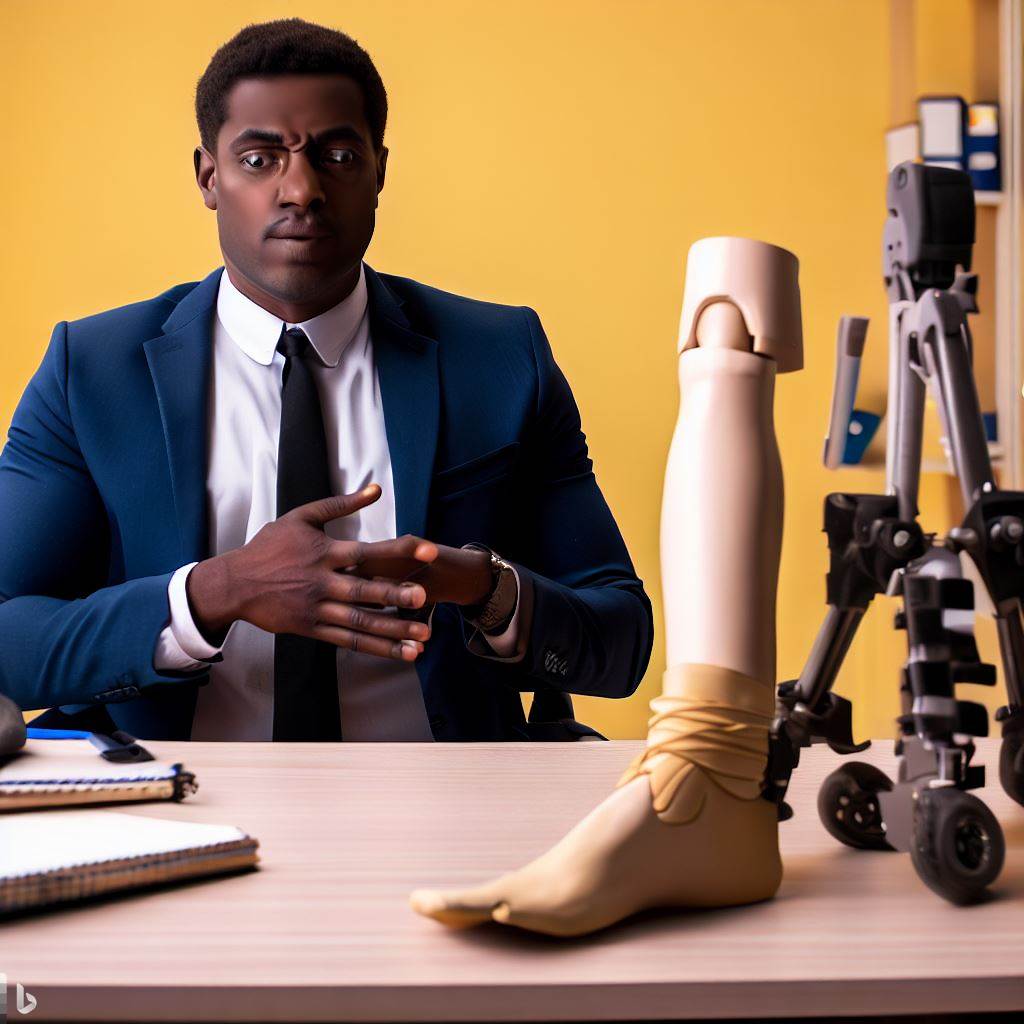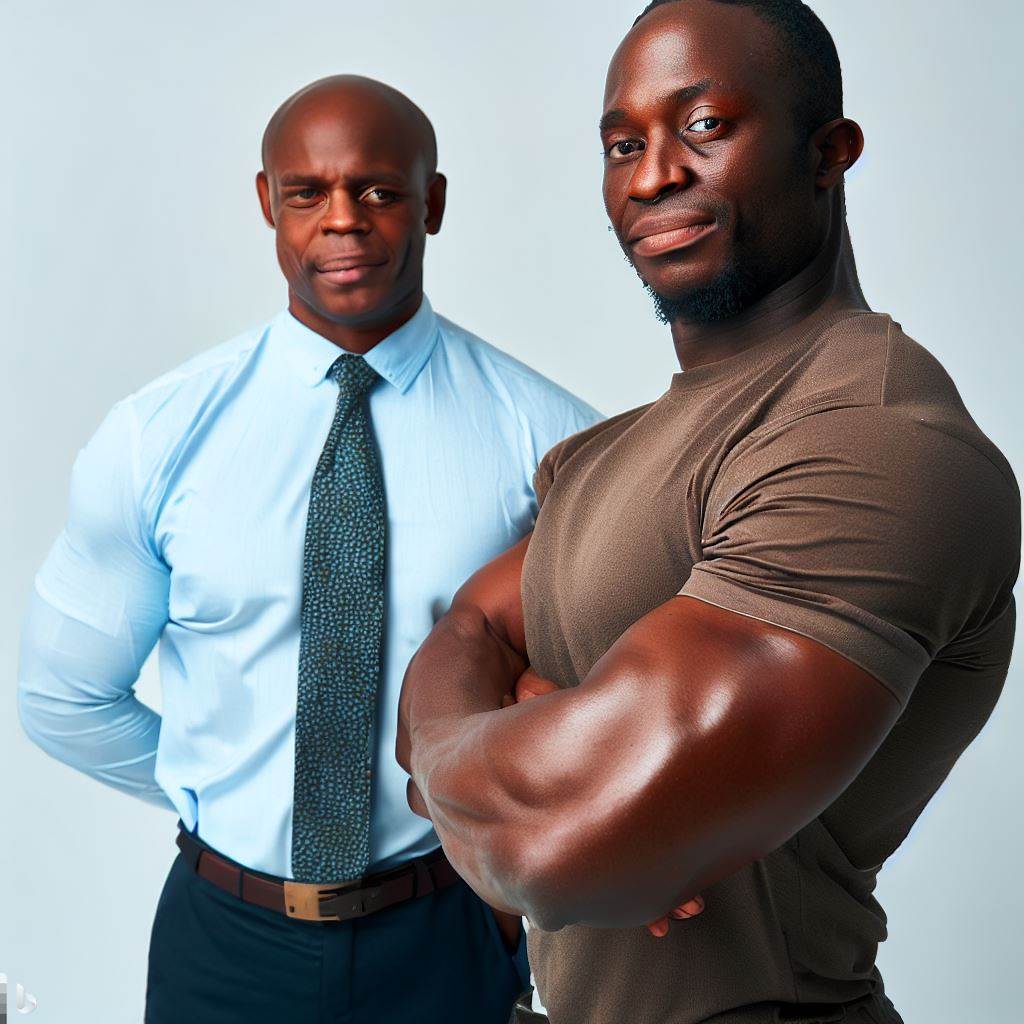Introduction
Orthotists and prosthetists play a crucial role in the healthcare system in Nigeria.
They are specialized healthcare professionals who design, fit, and fabricate medical devices, such as braces and prosthetic limbs, to assist patients with physical impairments and improve their quality of life.
Orthotists focus on the design and fitting of braces and orthopedic devices, while prosthetists specialize in the creation and fitting of artificial limbs.
Together, they provide essential support to individuals with musculoskeletal disabilities, enabling them to regain mobility and independence.
The importance of orthotists and prosthetists in healthcare cannot be overstated.
Their expertise helps patients recover from injuries, manage chronic conditions, and restore physical functionality.
By providing custom-made devices, these professionals help patients of all ages and backgrounds regain their confidence and participate fully in society.
In Nigeria, the orthotics and prosthetics industry is a growing field.
With an increasing population, there is a greater demand for orthotic and prosthetic services.
However, the industry faces several challenges.
Limited access to education and training programs for orthotists and prosthetists hinders the growth of the profession.
Additionally, the scarcity of resources and funding for research and development restricts the advancement of technology and innovation in the field.
Despite these challenges, orthotists and prosthetists in Nigeria continue to make significant contributions to healthcare.
Their dedication and expertise help improve the quality of life for countless individuals with physical disabilities.
It is essential for the government and healthcare organizations to recognize the importance of these professionals and provide the necessary support to overcome the challenges they face.
By doing so, Nigeria can ensure that orthotic and prosthetic services are readily available to all those in need, promoting inclusivity and enhancing the overall healthcare system.
Lack of Awareness and Understanding
Limited knowledge among the general public about orthotics and prosthetics
Orthotic and prosthetic services are not widely known or understood by the general population.
Many people in Nigeria are unaware of the benefits and applications of orthotics and prosthetics.
Due to this lack of knowledge, individuals may not seek proper treatment or support for their mobility challenges.
The limited knowledge about orthotics and prosthetics hinders access to these services.
There is a need to educate the public about the availability and effectiveness of orthotic and prosthetic interventions.
Misconceptions and myths surrounding orthotics and prosthetics
Some people believe that orthotics and prosthetics are only for individuals with severe disabilities.
There is a misconception that orthotics and prosthetics are costly and unaffordable for the average Nigerian.
Others may think that orthotics and prosthetics are uncomfortable and restrict mobility.
These misconceptions prevent individuals from considering orthotic and prosthetic solutions for their mobility issues.
Dispelling these myths is crucial in promoting acceptance and understanding of orthotics and prosthetics.
Importance of creating awareness campaigns and educational programs
- Educational programs can help educate the general public about the role of orthotists and prosthetists.
- Awareness campaigns can showcase success stories and testimonials to change public perceptions.
- Through educational programs, individuals can learn about the various types of orthotic and prosthetic devices available.
- By creating awareness, more funding and resources can be directed towards orthotic and prosthetic services.
- Collaboration with healthcare organizations and government bodies can help expand access to these services.
Overall, the challenges faced by orthotists and prosthetists in Nigeria regarding awareness and understanding are significant.
Limited public knowledge, misconceptions, and myths hinder access to these vital services.
However, by creating awareness campaigns and educational programs, we can improve understanding, dispel misconceptions, and ensure that individuals can benefit from orthotic and prosthetic interventions.
It is crucial to collaborate with various stakeholders to address these challenges and provide equal opportunities for all Nigerians in need of orthotic and prosthetic support.
Limited Resources and Infrastructure
Lack of proper training facilities and education programs
Orthotists and prosthetists in Nigeria face the challenge of a limited number of training facilities and education programs.
This shortage prevents them from acquiring the necessary skills and knowledge to provide effective care to their patients.
Scarcity of high-quality materials and prosthetic components
Another challenge faced by orthotists and prosthetists is the scarcity of high-quality materials and prosthetic components.
This shortage hampers their ability to create durable and functional prosthetics for their patients.
Insufficient funding for research and development
The lack of sufficient funding for research and development is a major obstacle for orthotists and prosthetists in Nigeria.
Without adequate financial support, they are unable to innovate and improve their practices, resulting in outdated and ineffective solutions.
Need for better access to advanced technology and equipment
Orthotists and prosthetists in Nigeria struggle with limited access to advanced technology and equipment.
This lack of access hinders their ability to provide the best possible care and limits the range of treatments they can offer.
Basically, orthotists and prosthetists in Nigeria face significant challenges due to limited resources and infrastructure.
The lack of proper training facilities and education programs, scarcity of high-quality materials and prosthetic components, insufficient funding for research and development, and the need for better access to advanced technology and equipment all contribute to the difficulties they encounter in providing optimal care to their patients.
Addressing these challenges is crucial for improving the quality of orthotic and prosthetic services in Nigeria and ensuring that individuals who require these services can lead fulfilling lives.
Read: Paramedic Certification in Nigeria: A Detailed Guide
Shortage of Skilled Professionals
A significant challenge faced by orthotists and prosthetists in Nigeria is the shortage of skilled professionals in the field.
Insufficient number of qualified orthotists and prosthetists
The number of qualified orthotists and prosthetists in Nigeria is inadequate to meet the growing demand for their services.
There is a lack of proper training programs and educational institutions offering orthotics and prosthetics courses.
This shortage hampers the ability of orthotists and prosthetists to provide timely and quality care to patients.
The existing professionals are often overburdened with workload due to the scarcity of colleagues.
Brain drain and emigration of professionals to other countries
Nigeria experiences a significant brain drain as skilled orthotists and prosthetists emigrate to other countries.
The allure of better job opportunities, higher salaries, and improved working conditions abroad attracts these professionals to leave Nigeria.
This emigration further exacerbates the shortage of skilled orthotists and prosthetists within the country.
The loss of these professionals also impacts the transfer of knowledge and expertise within the field.
Challenges in attracting and retaining skilled professionals in Nigeria
Nigeria faces difficulties in attracting and retaining skilled orthotists and prosthetists due to various factors.
The inadequate infrastructure and limited resources in orthotics and prosthetics facilities make the profession less enticing.
The lack of competitive salary structures and benefits discourage professionals from working in Nigeria.
The ongoing security challenges and unstable political environment also contribute to professionals seeking opportunities elsewhere.
There is a need for increased investment in the profession and improved working conditions to attract and retain skilled professionals.
Most importantly, the shortage of skilled orthotists and prosthetists in Nigeria poses a significant challenge to the field.
To address this issue, it is crucial to establish more training programs and educational institutions offering orthotics and prosthetics courses.
Additionally, efforts should be made to provide better working conditions, competitive salaries, and benefits to attract and retain professionals within the country.
By investing in the profession and addressing these challenges, Nigeria can ensure that orthotists and prosthetists are adequately skilled and available to meet the healthcare needs of its population.
Read: Clinical Practices for Physical Therapy Assistants in Nigeria

Cultural and Societal Factors
In Nigeria, orthotists and prosthetists face significant challenges in their profession due to cultural and societal factors.
These factors contribute to the stigma and discrimination against individuals with disabilities, limited support and acceptance from the community, and the role of cultural beliefs and traditional healers in shaping attitudes towards orthotics and prosthetics.
Stigma and discrimination against individuals with disabilities
Individuals with disabilities are often stigmatized and face discrimination in Nigerian society.
This stigma makes it difficult for orthotists and prosthetists to provide effective care and support to their patients.
The negative attitudes towards disability lead to exclusion, marginalization, and limited opportunities for individuals with disabilities to live a fulfilling life.
Limited support and acceptance from the community
The lack of support and acceptance from the community further compounds the challenges faced by orthotists and prosthetists.
Many people in Nigeria are unaware of the services provided by these professionals and the importance of orthotics and prosthetics in improving the quality of life for individuals with disabilities.
This lack of awareness and understanding hinders the integration of orthotics and prosthetics into the healthcare system.
Role of cultural beliefs and traditional healers in shaping attitudes towards orthotics and prosthetics
Cultural beliefs and the influence of traditional healers play a significant role in shaping attitudes towards orthotics and prosthetics in Nigeria.
Many communities believe that disabilities are a result of spiritual or supernatural causes, leading people to seek traditional healing methods instead of professional medical interventions.
This belief system undermines the value and effectiveness of orthotics and prosthetics, making it challenging for orthotists and prosthetists to gain acceptance and trust from the community.
The challenges faced by orthotists and prosthetists in Nigeria call for a comprehensive approach to address cultural and societal factors. Here are some potential solutions:
Education and awareness campaigns
Efforts should be made to educate the general public, community leaders, and traditional healers about orthotics and prosthetics.
These campaigns can help dispel myths and misconceptions surrounding disabilities and promote the importance of professional interventions for individuals with disabilities.
Collaboration with community leaders and stakeholders
Orthotists and prosthetists can collaborate with community leaders and stakeholders to promote acceptance and support for individuals with disabilities.
Engaging influential individuals can help change societal attitudes and encourage community members to seek professional care and support.
Training and capacity building
Providing training and capacity-building opportunities to orthotists, prosthetists, and other healthcare professionals can enhance their skills and knowledge in providing quality care.
This can strengthen the profession and improve the overall healthcare system’s response to the needs of individuals with disabilities.
Policy and legislative support
The Nigerian government should develop and implement policies that protect the rights of individuals with disabilities and promote their inclusion in society.
Legislation can help address discrimination and ensure equal access to healthcare services, including orthotics and prosthetics.
Most importantly, cultural and societal factors present significant challenges for orthotists and prosthetists in Nigeria.
The stigma and discrimination against individuals with disabilities, limited support and acceptance from the community, and the influence of cultural beliefs and traditional healers contribute to these challenges.
However, with concerted efforts to raise awareness, collaborate with stakeholders, provide training, and implement supportive policies, it is possible to overcome these challenges and improve the lives of individuals with disabilities in Nigeria.
Read: In-Depth: Nigeria’s Orthotic and Prosthetic Curriculum
Government Policies and Regulations
Lack of specific policies and guidelines for orthotics and prosthetics
The orthotics and prosthetics industry in Nigeria currently lacks specific policies and guidelines to govern its operations.
This absence of clear regulations poses challenges for orthotists and prosthetists in providing quality services.
Without specific policies, it is difficult to ensure standardized practices and patient safety in the field.
Orthotists and prosthetists often face confusion and ambiguity in their work due to the lack of established guidelines.
This absence of clear policies also hampers the growth and development of the profession in Nigeria.
Inadequate regulation and oversight of the industry
The orthotics and prosthetics industry in Nigeria suffers from inadequate regulation and oversight.
There is a lack of regulatory bodies or agencies responsible for monitoring and enforcing quality standards.
This lack of oversight allows unqualified individuals to practice in the field, compromising patient safety.
Without proper regulation, orthotists and prosthetists face difficulties in maintaining professional ethics and standards.
The absence of oversight also contributes to the proliferation of substandard orthotic and prosthetic devices in the market.
Importance of advocacy for improved policies and regulations
Advocacy plays a crucial role in addressing the challenges faced by orthotists and prosthetists in Nigeria.
Advocacy efforts should focus on pushing for the development and implementation of specific policies and guidelines.
Stakeholders in the orthotics and prosthetics industry should collaborate to advocate for improved regulation.
Advocacy can raise awareness about the importance of quality standards and the need for regulatory bodies.
By engaging policymakers and relevant authorities, advocacy can drive positive change in the industry.
Continuous advocacy efforts can lead to the establishment of regulatory bodies and the enforcement of standards.
Improved policies and regulations will create a conducive environment for orthotists and prosthetists to thrive.
The challenges faced by orthotists and prosthetists in Nigeria regarding government policies and regulations are significant.
The lack of specific policies and guidelines hinders the growth and standardization of the profession.
Inadequate regulation and oversight allows for the presence of unqualified practitioners and substandard devices.
To address these challenges, advocacy for improved policies and regulations is essential.
Collaborative efforts can push for the development of specific guidelines and the establishment of regulatory bodies, ensuring the provision of quality orthotic and prosthetic services in Nigeria.
Read: Orthotic/Prosthetic Patient Experiences in Nigeria
Access to Affordable Care
In Nigeria, orthotists and prosthetists encounter significant challenges concerning access to affordable care, particularly with regard to orthotic and prosthetic devices.
These issues hinder the ability of many Nigerians to receive essential services for their mobility and functional needs.
High Costs of Orthotic and Prosthetic Devices
One of the primary obstacles faced by orthotists and prosthetists in Nigeria is the exorbitant cost of orthotic and prosthetic devices.
These devices are crucial for individuals with physical disabilities to lead independent and fulfilling lives.
However, due to their high expenses, a considerable portion of the population finds them financially unattainable, leaving them without the necessary aids to enhance their mobility and quality of life.
Limited Insurance Coverage and Reimbursement Options
Another challenge that significantly affects access to affordable care is the scarcity of insurance coverage and reimbursement options for orthotic and prosthetic devices.
The lack of adequate insurance support means that individuals are often forced to bear the burden of these costs entirely on their own, further restricting their ability to procure the essential devices they require.
Impact of Financial Barriers on Patients’ Access to Essential Services
The prevailing financial barriers experienced by patients present a significant obstacle to accessing orthotic and prosthetic services.
With limited financial resources, patients are unable to afford the necessary consultations, fittings, and follow-up care required to ensure the proper functioning and fit of their devices.
Consequently, their access to essential orthotic and prosthetic services is severely hindered, hindering their overall well-being and independence.
Generally, the challenges faced by orthotists and prosthetists in Nigeria are multifaceted, primarily revolving around the high costs of orthotic and prosthetic devices, limited insurance coverage, and the impact of financial barriers on patients’ access to essential services.
Addressing these issues is crucial to ensure that all Nigerians have access to affordable and necessary orthotic and prosthetic care, enabling them to lead fulfilling lives with improved mobility and functionality.
Read: Occupational Therapy Schools: Where to Study in Nigeria
Collaboration and Networking
Importance of collaboration between orthotists, prosthetists, and other healthcare professionals
Collaboration between orthotists, prosthetists, and other healthcare professionals is crucial in providing comprehensive care to patients.
Orthotists and prosthetists rely on the expertise and knowledge of other healthcare professionals to enhance their practice.
Collaboration helps in the accurate diagnosis, treatment planning, and implementation of orthotic and prosthetic interventions.
Working together with other healthcare professionals improves patient outcomes and quality of life.
Establishing professional associations and networks
Establishing professional associations for orthotists and prosthetists promotes collaboration and knowledge sharing.
These associations provide a platform for professionals to meet, discuss challenges, and find solutions collectively.
Professional networks facilitate the exchange of information, research findings, and advancements in orthotics and prosthetics.
By joining associations and networks, orthotists and prosthetists can access resources and opportunities for professional growth.
Sharing best practices and experiences with international counterparts
Orthotists and prosthetists in Nigeria can benefit from sharing best practices and experiences with their international counterparts.
Collaboration with international professionals allows for the exchange of knowledge, techniques, and advancements in the field.
Learning from international experiences can help Nigerian orthotists and prosthetists overcome local challenges and improve patient care.
Collaborative efforts with international counterparts can also open doors for research collaborations and professional development opportunities.
In review, collaboration and networking play a vital role in overcoming the challenges faced by orthotists and prosthetists in Nigeria.
Working together with other healthcare professionals, establishing professional associations, and sharing experiences with international counterparts can enhance the practice of orthotics and prosthetics in the country.
Through collaboration, orthotists and prosthetists can provide comprehensive care, access valuable resources, and stay updated with advancements in the field.
By embracing collaboration and networking, the orthotics and prosthetics community in Nigeria can work towards improving patient outcomes and elevating the profession as a whole.
Read: The Journey to Becoming a Registered Nurse in Nigeria
Conclusion
Recap of the challenges faced by orthotists and prosthetists in Nigeria
In Nigeria, orthotists and prosthetists face numerous challenges in their profession.
These include lack of funding, limited access to quality education and training, inadequate government support, and limited public awareness and recognition of their services.
Call to action for addressing the challenges and improving the orthotics and prosthetics industry
It is crucial for the Nigerian government and relevant stakeholders to take immediate action.
This includes providing sufficient funding for education, training, and research, establishing regulatory bodies to ensure high standards, and creating awareness campaigns to educate the public about the importance of orthotists and prosthetists.
Importance of recognizing the valuable contributions of orthotists and prosthetists in healthcare
Orthotists and prosthetists play a pivotal role in improving the quality of life for individuals with limb impairments.
By recognizing their contributions and addressing the challenges they face, Nigeria can enhance the overall healthcare system and provide better rehabilitation services to its citizens.
In short, the challenges faced by orthotists and prosthetists in Nigeria are significant but not insurmountable.
By addressing the funding, education, and awareness issues, Nigeria can pave the way for a stronger orthotics and prosthetics industry that will ultimately benefit the health and well-being of its population.
It is crucial for all stakeholders to work together to overcome these challenges and ensure a brighter future for orthotics and prosthetics in Nigeria.




